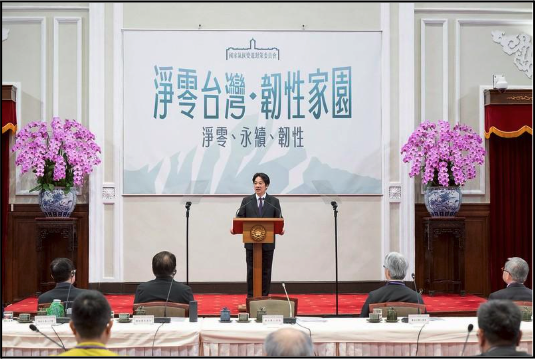Like all nations, Taiwan is affected by climate change. The Climate Change in Taiwan: National Scientific Report 2024 reveals that the average air temperatures of Taipei, Taichung, Tainan, Hengchun, Hualien, as well as Taitung, have all risen considerably since 1980. In 2025, Taiwan ranked 60th on the Climate Change Performance Index due to its very poor ratings for energy use and greenhouse gas emissions, as well as weak scores for renewable energy and climate policy.
Following the United Nations Earth Summit of 1992, Taiwan’s Executive Yuan established the National Council for Sustainable Development (NCSD, 行政院國家永續發展委員會) in August 1997 to pursue global sustainable development in tandem with other countries. With the establishment of this administrative body, Taiwan has shown a strong commitment to tackling climate change as part of the new global agenda derived from the United Nations (UN). Even though Taiwan has not had its own seat at the UN since 1971, it has nonetheless followed and supported the UN’s agendas, including those aimed at climate change. However, tackling climate change is beyond the ability of Taipei alone and requires transnational cooperation—not only by states, but also by businesses.
Lai’s National Resilience Plan
According to the 2023 Annual Report on National Sustainable Development published by the NCSD, Taiwan has sought to mitigate climate change in three core aspects: law, education, and climate change adaptation capabilities. On February 15, 2023, the Executive Yuan issued a presidential degree amending the Greenhouse Gas Reduction and Management Act (溫室氣體減量及管理法) to the Climate Change Response Act (氣候變遷因應法), thus promulgating Taiwan’s climate legal framework. Following this revision of the Act, the Ministry of Environment (環境部) has revised and promulgated six laws concerning management regulations for greenhouse gases to enforce Taiwan’s climate governance. Meanwhile, the Ministry of Education (教育部) has organized and subsidized several activities and workshops for climate change education that draw from the United Nations Education for Sustainable Development program. The Executive Yuan also approved the National Climate Change Adaptation Action Plan (2023-2026) on October 4, 2023, with a goal to enhance Taiwan’s basic capabilities to adapt to climate change.
At the 31st Council Meeting of the NCSD, Executive Yuan, Lai Ching-te (賴清德), the President of the Republic of China (Taiwan), stated that “sustainable development has become an issue of national public concern. The government attaches great importance to promoting sustainable development.” Under Lai’s direction, Taiwan launched a new governmental initiative within the Presidential Office to address global warming. Furthermore, Lai’s 2024 National Day speech characterized global climate change, sudden outbreaks of infectious diseases, and expanding authoritarianism as Taiwan’s “relentless challenges.” To cope with these issues, Lai added that he has established three committees directly under his power: the National Climate Change Committee (國家氣候變遷對策委員會), the Healthy Taiwan Promotion Committee (健康台灣推動委員會), and the Whole-of-Society Defense Resilience Committee (全社會防衛韌性委員會). In his speech, Lai revealed that these three committees are closely tied through the theme of “national resilience” (國家韌性). Lai stated: “We intend to build up a more resilient Taiwan, proactively deal with challenges, and bring Taiwan into deeper cooperation with the international community.”
The National Climate Change Committee has convened four meetings as of June 2025. The committee’s objective is to hold panel discussions between the government, including cabinet ministers and the Ministry of Environment, scholars led by Academia Sinica (中央研究院), the industrial sector led by the Pegatron Corporation, and civil society groups. During the three conventions, Lai primarily emphasized energy efficiency and green technology. While the former issue explores how Taiwan can optimize energy consumption, the latter is about enhancing Taiwan’s international competitiveness in the global supply chain. For the fourth meeting of the National Climate Change Committee in April 2025, Lai emphasized green transition and sustainable development as the cornerstones of long-term national prosperity. Lai stated: “The government will work with the private sector to turn crises into opportunities, and actively address the challenges of climate change and net-zero transition.” At the second meeting of the National Climate Change Committee in October 2024, Lai stressed the importance of strengthening international cooperation to cope with climate change. He also mentioned the People’s Republic of China (PRC) as a potential target for collaboration. In this way, Lai regards climate change issues as being independent of the cross-Strait conflict. When it comes to climate change, it can be concluded that Lai’s “national resilience” is not simply a matter of military strategic thinking, but rather a roadmap for multilateralism.

Image: President Lai addresses the fourth meeting of the National Climate Change Committee. (Image source: Office of the President, Republic of China [Taiwan])
The Taipei Times reports that Taiwan has worked with the Pacific islands and like-minded partners to contribute to climate change mitigation and adaptation. Although Taiwan cannot attend the UN Climate Change Conference (COP) as a UN member, a Taiwanese delegation has been able to participate as NGO observers under the Industrial Technology Research Institute (ITRI) since 1995. In 2023, at the COP28 in Dubai, the United Arab Emirates—as well as 12 formal diplomatic allies and 42 national parliaments—sent letters supporting Taiwan’s participation in meetings relating to the United Nations Framework Convention on Climate Change and the Paris Agreement. Taiwan is not a member of the UN and, thus, does not receive timely information from its organs. Therefore, Taiwan’s potential UN membership is relevant to its goal of achieving national resilience regarding climate change, and Lai must jointly work with diplomatic allies to gain further support for UN membership. However—besides government-level cooperation—business sectors and private technology are critical in plans to counter global warming.
Business Action
By laying a foundation in research and development (R&D), the Taiwanese government is treating the development of climate change technologies as a business opportunity. Article 17, paragraph 6 of the Climate Change Response Act states that the government shall assist and encourage the development of technologies for climate change adaptation, and promote products and business opportunities derived from climate change adaptation. Furthermore, in Taiwan’s 2050 net-zero emissions roadmap, technology R&D is listed as one of Taiwan’s governance foundations. The R&D revolves around technology related to decarbonization, sustainable energy, and circularity, with an emphasis on public-private partnerships. Su Huey-jen (蘇慧貞)—a professor emeritus of the Department of Environmental and Occupational Health at National Cheng Kung University (國立成功大學)—opined at the second meeting of the National Climate Change Committee that: “Advancing net-zero transition and deep energy saving requires actively leveraging private sector resources to maximize the benefits of public-private collaboration.” In its law, plans, and fora, the government has deliberately included the Taiwanese private sector in its climate change strategy to strengthen the development of advanced technologies.
In 2022, eight leading global information and communications technology companies in Taiwan—Acer, ASUSTeK Computer, AUO, Delta Electronics, LITEON, Microsoft Taiwan, Pegatron, and Taiwan Semiconductor Manufacturing Company (TSMC)—have collaborated on the establishment of the Taiwan Climate Partnership (TCP, 台灣氣候聯盟). The TCP aims to implement Taiwan’s net-zero goal in supply chains. In December 2024, the TCP signed a Memorandum of Understanding (MOU) with the Japan Climate Leaders Partnership (Japan-CLP)—a business coalition in Japan aiming to create a low-carbon society. Overall, the MOU aspires to promote partnerships to tackle climate change, especially in the Asia-Pacific region.

Image: The key eight firms that founded the Taiwan Climate Partnership (Image source: Taiwan Climate Partnership)
In tandem with the TCP, the Taipei Computer Association (TCA, 台北市電腦商業同業公會)—the largest industrial association in Taiwan, with over 4,000 member companies—emphasizes carbon reduction in its initiatives to boost international cooperation. For example, on March 11, 2024, Dr. Chen-Yu Lee (李鎮宇), a Chief Executive Officer of the TCA, visited the Thailand Trade and Economic Office in Taipei (TTEO) to promote close cooperation with Thailand regarding net-zero policies and green technology. In a readout of the meeting, Narong Boonsatheanwong (文那隆), the executive director the TTEO, stated that the TCA’s promotion aligns with Thailand’s domestic policy of a Bio-Circular-Green Economy. By seeking international cooperation at the business level, the TCP and TCA have shown Taiwan’s industrial sector is willing to combat global warming.
Cooperation is Key
Just as with its business sector, Taiwan’s local government is also partnering with the central government to counter climate change. In 2017, the Executive Yuan approved the National Climate Change Action Guideline (國家因應氣候變遷行動綱領), formulated by the Environmental Protection Administration (環境部環境管理署). This guideline proposes ten principles for promoting Taiwan’s greenhouse gas mitigation and climate change adaptation policies. One of its principles is to: “Establish a communication platform on which to build partnerships between the central and local governments, as well as cooperation between public and private sectors, to practically execute localised adaptation and mitigation measures.” Thus, multilateral cooperation at all levels—including national governments, businesses, municipalities, and international organizations—is key to enhancing Taiwan’s efforts to tackle global warming.
The main point: Since 1997, Taiwan has actively promoted climate change mitigation policies in line with United Nations agendas. The National Climate Change Committee—convened by Lai Ching-te in 2024—and Taiwan’s National Council for Sustainable Development have been critical in this effort. While Taiwan’s bilateral diplomatic cooperation is limited due to its exclusion from the UN, Taiwanese private sector groups, such as the Taiwan Climate Partnership and the Taipei Computer Association, can expand their climate-related cooperation with foreign state and non-state actors.




